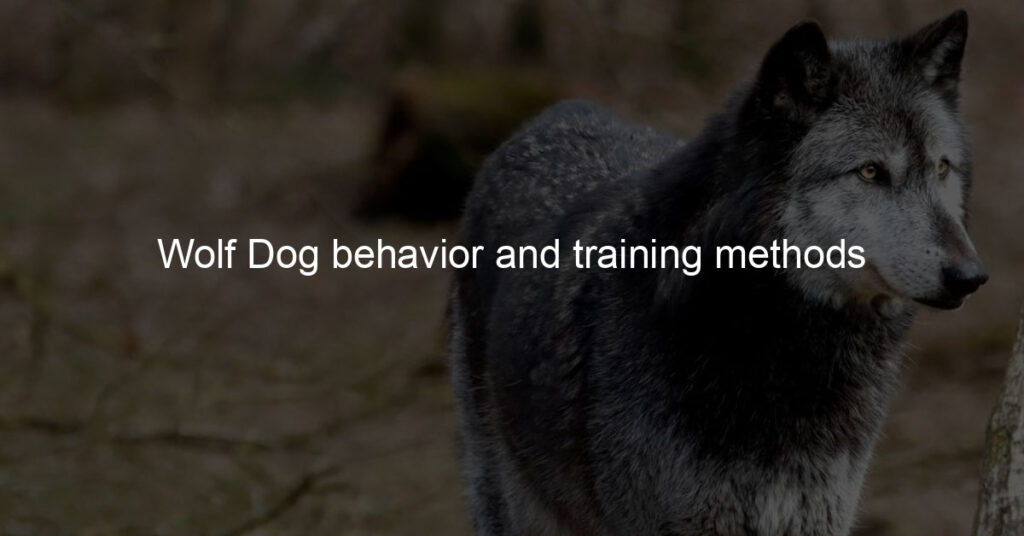If you’ve ever wanted to own a wolf-dog but felt concerned about how their unique behavior and demands can be managed, then this blog post is for you. Here we will explore the basics of Wolf Dog behavior and training methods so that you can better understand how to best care for these beautiful hybrid Wild Canids.
We’ll discuss tips on socializing them as well as explore potential challenges these furry companions pose. Whether you’re looking for guidance on behavior management or trying to decide if a Wolf Dog is right for your lifestyle, there’s something in this guide for everyone interested in learning more about these amazing creatures!
Can wolfdogs be trained?
Wolfdogs, a hybrid of wolves and domestic dogs, often have an unpredictable temperament. However, their natural intelligence and trainability make it possible to train wolfdogs to some degree. Teaching basic commands such as “sit,” “stay,” or “down” is quite doable with the right approach – typically one that rewards positive behaviors. During the process, consistency and patience are key.
Wolfdogs need a consistent trainer that sets firm boundaries and sticks with them. Additionally, rewards such as treats for good behavior help keep wolfdogs motivated during training sessions. Although challenging due to their natural impulses, wolfdogs can learn to respond to commands. With dedication from their trainers, wolfdog owners can succeed in training their canine companions.
What is the behavior of a wolfdog?
Wolfdogs, also known as wolf hybrids, are interesting animals to study. They are a combination of two species, domestic dogs and gray wolves, and have inherited traits from both animals. Wolfdogs’ behavior can vary greatly depending on their mix and their ancestry.
Some may be friendly and energetic like dogs, while others may exhibit more primal behaviors such as fear vs dominance. Wolfdogs tend to be very intelligent animals with high learning potential, making them incredibly trainable.
Although they can make wonderful companions, wolfdogs often require experienced handlers due to their higher natural energy levels. All in all, a wolfdog’s behavior is impacted by their breed mix and the environment they are raised in; they should always be treated with kindness while being given clear boundaries to ensure their health and well-being.
How much exercise does a wolf-dog need?
Wolf dogs are some of the most active and energetic pups around. They require plenty of physical and mental stimulation alike, so daily walks, romps in the backyard, and even agility exercises are all necessary to keep them healthy and happy. Physical exercise is essential for wolf dogs; they need at least one hour of outdoor time every day, plus indoor activities such as chew toys and puzzle toys.
Of course, if your pup has a particularly high activity level then more regular training sessions are also encouraged. As long as you’re providing plenty of enriching outlets for their wild spirits, rest assured that your wolf dog will make the most out of their exercise routine!
How do you discipline a wolf dog?
Wolf dogs can be great pets, but it’s important to use the right kind of discipline when training them. It’s important to be firm and consistent, with clear boundaries and rules that are communicated clearly.
Positive reinforcement is key when disciplining wolf dogs since they respond well to praise and rewards. Avoid physical punishments like jerking on the leash or harsh corrections; instead redirect their attention with a treat or toy.
Also, establish the alpha role by standing tall and speaking in a confident voice when holding them accountable for any bad behavior- this will help them recognize you as the one in charge! Once your pup has learned expectations and boundaries, most of the work is done. With patience, dedication, and consistency your wolf dog can still make an amazing companion!
Conclusion: Wolf Dog behavior and training methods
Training your wolf dog is a labor of love, but its rewards are worth the effort. It requires patience, consistency, and lots of positive reinforcement. However, if you’re willing to commit to their unique behavioral needs, your wolf dog can be an incredibly rewarding companion.
Working with a knowledgeable canine behaviorist or trainer who specializes in wolf dogs can help you learn to bond better with your four-legged friend and make sure they’re as happy as possible. With care, thoughtfulness, and dedication, any pet parent can give their special pup the life they deserve. So remember: some (wolf)dog stories have a happy ending!








